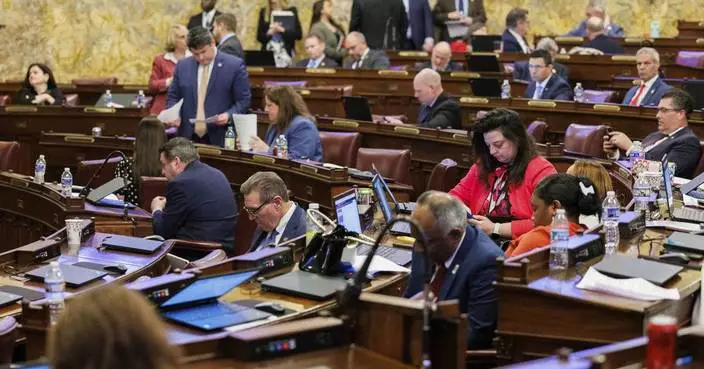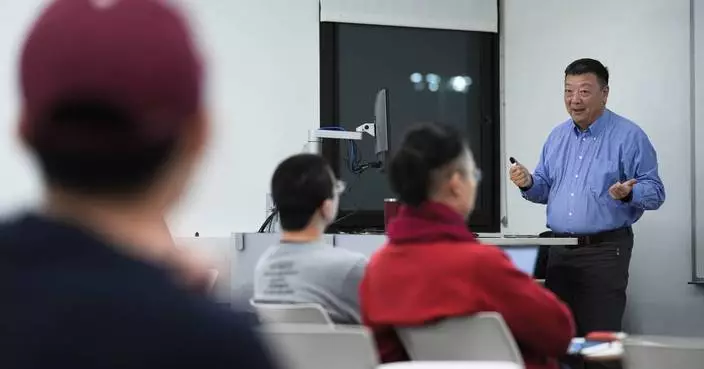What's most fascinating about Google's new Pixel 2 phone is what's to come.
The phone sets itself apart with promises to bake in Google's powerful artificial-intelligence technology for quick and easy access to useful, even essential information. But much of the neat stuff will come later. The phone coming out Thursday is more of a teaser.
To be sure, the Pixel 2 is a solid phone. It's not as elegantly designed as an iPhone or a Samsung Galaxy phone. But it delivers a strong tie-in to Google's services, including those intended to fetch what you need automatically.
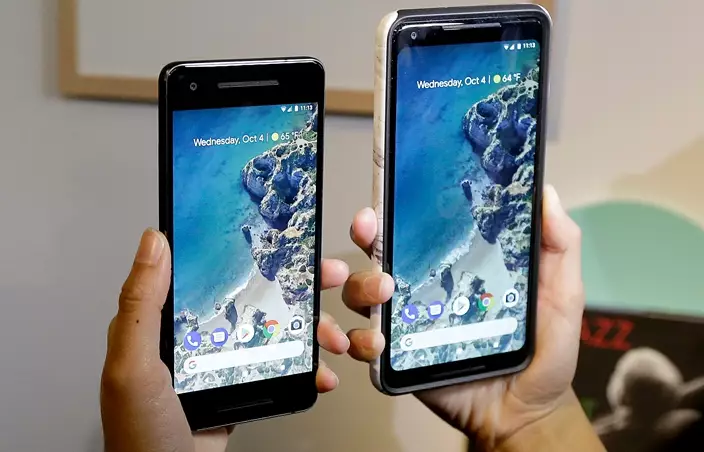
FILE - In this Wednesday, Oct. 4, 2017, file photo, a woman holds up the Google Pixel 2 phone, left, next to the Pixel 2 XL phone at a Google event at the SFJAZZ Center in San Francisco. (AP Photo/Jeff Chiu, File)
VISUAL SEARCH ENGINE
The Pixel 2 comes with Google Lens, a way of searching Google just by pointing your camera at a landmark, object or storefront. This can give you quick access to reviews and store hours. It might help identify that mysterious building you walk by every day. Google Lens will also pull out web addresses and phone numbers from signs so you can browse or call with just at tap.
The feature correctly identified paintings of obscure figures in American history at a museum in New York, and it knew which Starbucks I was standing in front of, out of several in the neighborhood. But it's not foolproof: The iconic United Nations building came across as a generic tower.
I found Google Lens slightly more reliable than a similar Samsung feature, Bixby Vision. Bixby tended to miss on identifying businesses; a Chinatown bakery serving pork buns was thought to be a CrossFit gym — quite the opposite. On the other hand, Bixby identified a plaque dedicated to a Titanic victim, while Google just said, "Hmm."
It's a good start, but both still have work to do. And for now, Google Lens requires you to take a photo first. Seamless, instant analysis is "coming soon." All you'll have to do is squeeze the bottom of the phone for the Google Assistant to pop up.
Last year's Pixel phone will also get Google Lens, though without the squeezing capability. Eventually, other Android phones and iPhones should get it, too, but Google isn't saying when.
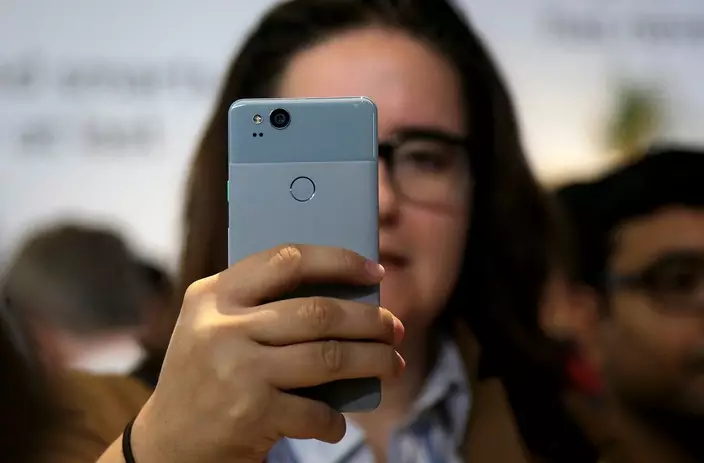
FILE - In this Wednesday, Oct. 4, 2017, file photo, a woman looks at a Google Pixel 2 phone at a Google event at the SFJAZZ Center in San Francisco. What’s most fascinating about Google’s new Pixel 2 phone is what’s to come.(AP Photo/Jeff Chiu, File)
BETTER CAMERA
Last year's Pixel had a great camera, but it fell short in some shots because software processing made colors look too strong and clean at times. With the Pixel 2, colors look good without looking fake.
The Pixel 2 also introduces a "portrait" mode, which blurs out backgrounds to focus attention on the subjects. Apple's iPhone 7 Plus and 8 Plus and Samsung's Galaxy Note 8 manage this effect via a second camera lens to sense depth. Google does it all with software, so the regular-size model gets the capability as well, not just the larger XL.
Google says the feature works best with people and small objects. I got it to work for flowers and selfies (yes, it works with the front camera, too, something limited elsewhere to Apple's upcoming iPhone X). But I couldn't blur out tourists ambling behind statues; Apple and Samsung phones managed that with the depth lens. Not to mention that second lens offers a 2x zoom without a reduction in quality.
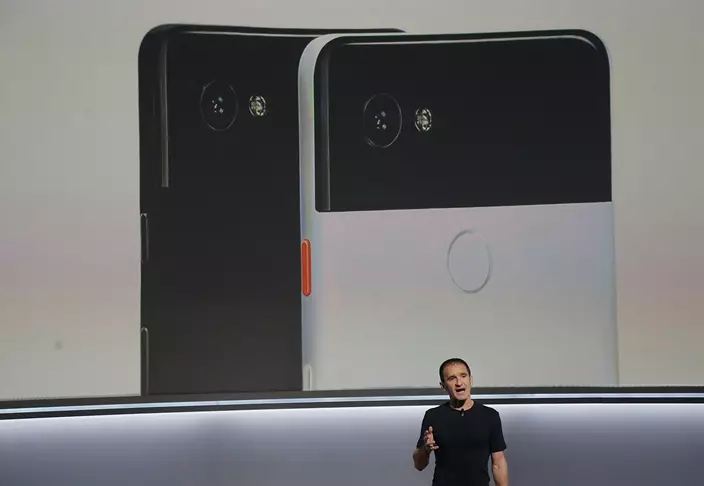
FILE - In this Wednesday, Oct. 4, 2017, file photo, Google's Mario Queiroz speaks about the Google Pixel 2 XL phones at a Google event at the SFJAZZ Center in San Francisco. (AP Photo/Jeff Chiu, File)
MORE SMARTS
When locked, the phone continually listens for songs and automatically identifies the name and artist. There have been times songs ended before I could pull up SoundHound to do this. Google says all this is done on the phone itself, so it's not sending your music tastes to its servers. Google says the battery drain should be minimal.
Next month, $159 wireless headphones called Pixel Buds will offer real-time audio translation, so two people can communicate using different languages, while hearing instant translations in a native tongue. A separate Google Translate app offers this now, but having the feature built into Pixel should make it easier to use.
And speaking of translations, I'm hoping Google Lens will one day translate signs instantly when traveling. A camera feature in the Translate app isn't as automatic as Lens tends to be. Google says more capabilities are coming to Lens, but it didn't provide details.
___
PATIENCE, PLEASE
The fact that the Pixel is unfinished shouldn't deter would-be buyers. This is common these days, as more power comes through software updates rather than hardware. Samsung's Galaxy S8 phones shipped this spring without its much-touted Bixby assistant ready.
What you get in the $650 Pixel 2 is a great workhorse. For elegance, you need the $700 iPhone 8 or the $750 Galaxy S8. The larger Pixel 2 XL starts at $850, more than the iPhone 8 Plus and the S8 Plus. Apple and Samsung include headphones; Google doesn't. But the Pixel 2 comes with a USB-C adapter so you can plug in ordinary headphones; like the latest iPhones, the Pixel 2 has eliminated the standard headphone jack.
Verizon is again the only U.S. carrier to offer the latest Pixel, although you can buy models that will work with other carriers — and Google's own Project Fi service — at Google's online store. The phone is also coming to the U.K., Canada, India, Australia, Germany, Italy and Spain.
DENVER (AP) — Artificial intelligence is helping decide which Americans get the job interview, the apartment, even medical care, but the first major proposals to reign in bias in AI decision making are facing headwinds from every direction.
Lawmakers working on these bills, in states including Colorado, Connecticut and Texas, came together Thursday to argue the case for their proposals as civil rights-oriented groups and the industry play tug-of-war with core components of the legislation.
“Every bill we run is going to end the world as we know it. That’s a common thread you hear when you run policies,” Colorado’s Democratic Senate Majority Leader Robert Rodriguez said Thursday. “We’re here with a policy that’s not been done anywhere to the extent that we’ve done it, and it’s a glass ceiling we’re breaking trying to do good policy.”
Organizations including labor unions and consumer advocacy groups are pulling for more transparency from companies and greater legal recourse for citizens to sue over AI discrimination. The industry is offering tentative support but digging in its heels over those accountability measures.
The group of bipartisan lawmakers caught in the middle — including those from Alaska, Georgia and Virginia — has been working on AI legislation together in the face of federal inaction. On Thursday, they highlighted their work across states and stakeholders, emphasizing the need for AI legislation and reinforcing the importance for collaboration and compromise to avoid regulatory inconsistencies across state lines. They also argued the bills are a first step that can be built on going forward.
“It’s a new frontier and in a way, a bit of a wild, wild West,” Alaska’s Republican Sen. Shelley Hughes said at the news conference. “But it is a good reminder that legislation that passed, it’s not in stone, it can be tweaked over time.”
While over 400 AI-related bills are being debated this year in statehouses nationwide, most target one industry or just a piece of the technology — such as deepfakes used in elections or to make pornographic images.
The biggest bills this team of lawmakers has put forward offer a broad framework for oversight, particularly around one of the technology's most perverse dilemmas: AI discrimination. Examples include an AI that failed to accurately assess Black medical patients and another that downgraded women’s resumes as it filtered job applications.
Still, up to 83% of employers use algorithms to help in hiring, according to estimates from the Equal Employment Opportunity Commission.
If nothing is done, there will almost always be bias in these AI systems, explained Suresh Venkatasubramanian, a Brown University computer and data science professor who’s teaching a class on mitigating bias in the design of these algorithms.
“You have to do something explicit to not be biased in the first place,” he said.
These proposals, mainly in Colorado and Connecticut, are complex, but the core thrust is that companies would be required to perform “impact assessments" for AI systems that play a large role in making decisions for those in the U.S. Those reports would include descriptions of how AI figures into a decision, the data collected and an analysis of the risks of discrimination, along with an explanation of the company’s safeguards.
Requiring greater access to information on the AI systems means more accountability and safety for the public. But companies worry it also raises the risk of lawsuits and the revelation of trade secrets.
David Edmonson, of TechNet, a bipartisan network of technology CEOs and senior executives that lobbies on AI bills, said in a statement that the organization works with lawmakers to “ensure any legislation addresses AI’s risk while allowing innovation to flourish.”
Under bills in Colorado and Connecticut, companies that use AI wouldn’t have to routinely submit impact assessments to the government. Instead, they would be required to disclose to the attorney general if they found discrimination — a government or independent organization wouldn't be testing these AI systems for bias.
Labor unions and academics worry that over reliance on companies self-reporting imperils the public or government's ability to catch AI discrimination before it's done harm.
“It’s already hard when you have these huge companies with billions of dollars,” said Kjersten Forseth, who represents the Colorado's AFL-CIO, a federation of labor unions that opposes Colorado's bill. “Essentially you are giving them an extra boot to push down on a worker or consumer.”
The California Chamber of Commerce opposes that state's bill, concerned that impact assessments could be made public in litigation.
Another contentious component of the bills is who can file a lawsuit under the legislation, which the bills generally limit to state attorney generals and other public attorneys — not citizens.
After a provision in California's bill that allowed citizens to sue was stripped out, Workday, a finance and HR software company, endorsed the proposal. Workday argues that civil actions from citizens would leave the decisions up to judges, many of whom are not tech experts, and could result in an inconsistent approach to regulation.
Sorelle Friedler, a professor who focuses on AI bias at Haverford College, pushes back.
“That’s generally how American society asserts our rights, is by suing,” said Friedler.
Connecticut’s Democratic state Sen. James Maroney said there’s been pushback in articles that claim he and Rep. Giovanni Capriglione, R-Texas, have been “pedaling industry-written bills” despite all of the money being spent by the industry to lobby against the legislation.
Maroney pointed out one industry group, Consumer Technology Association, has taken out ads and built a website, urging lawmakers to defeat the legislation.
“I believe that we are on the right path. We’ve worked together with people from industry, from academia, from civil society,” he said.
“Everyone wants to feel safe, and we’re creating regulations that will allow for safe and trustworthy AI," he added.
Associated Press reporters Trân Nguyễn contributed from Sacramento, California, Becky Bohrer contributed from Juneau, Alaska, Susan Haigh contributed from Hartford, Connecticut.
Bedayn is a corps member for the Associated Press/Report for America Statehouse News Initiative. Report for America is a nonprofit national service program that places journalists in local newsrooms to report on undercovered issues.
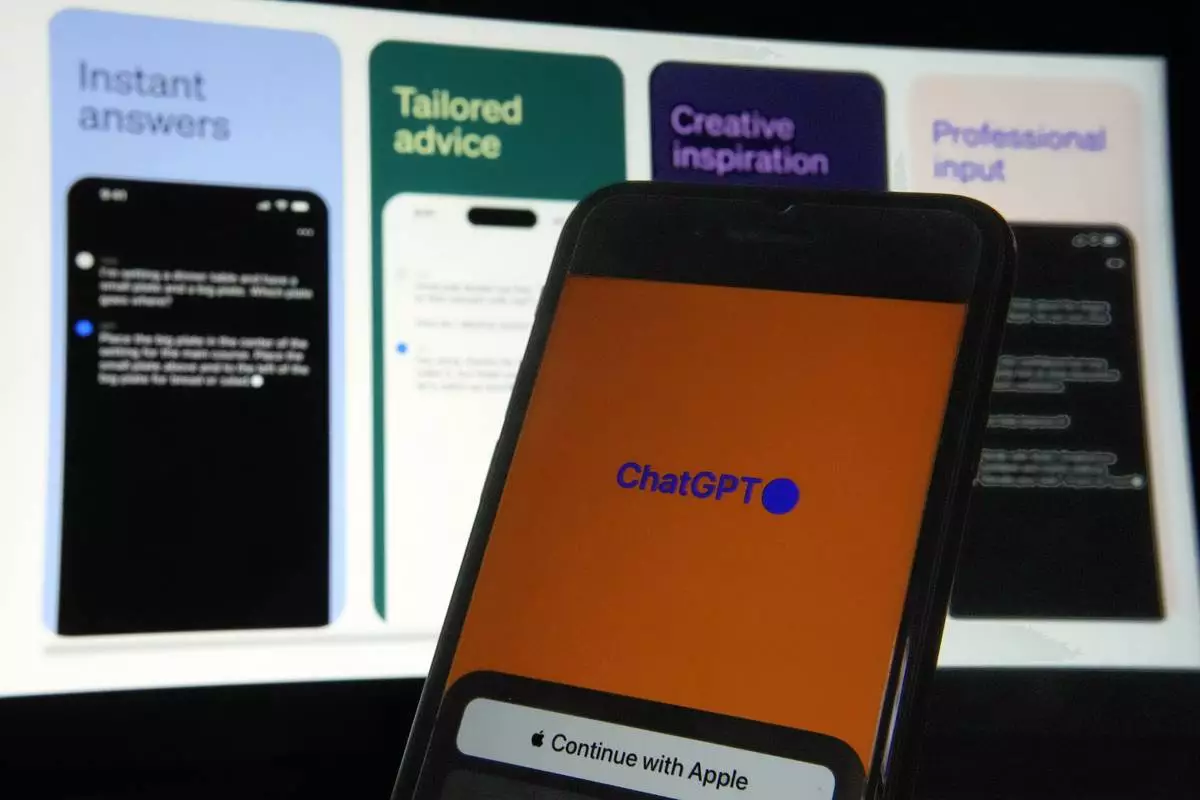
FILE - OpenAI's ChatGPT app is displayed on an iPhone in New York, May 18, 2023. With companies deploying artificial intelligence to every corner of society, state lawmakers are playing catch-up with the first major proposals to reign in AI's penchant for discrimination — but those bills face blistering headwinds from every direction. (AP Photo/Richard Drew, File)










